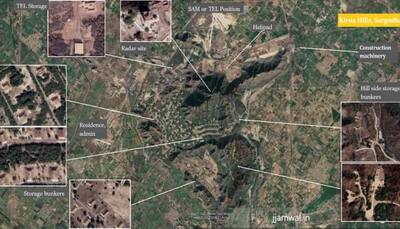New Delhi: In the aftermath of India’s recent high-precision airstrikes deep inside Pakistani territory, claims and counterclaims have flooded social media and diplomatic corridors alike. While Pakistani authorities downplay the significance of the Kirna Hills strikes, insisting only “empty hillside” was hit, emerging satellite imagery and military analysis suggest otherwise.
Military experts believe that the Kirna Hills region, which is often dismissed as remote and unimportant, houses an underground nuclear weapons storage complex. Multiple visible entrances and reinforced tunnel structures have been identified in satellite images over the years, supporting long-standing speculation about its strategic value. According to defense analysts, the site was likely hit with multiple bunker-penetrating munitions, indicating a deliberate attempt to cripple or degrade sensitive infrastructure.
In response to widespread disbelief that such a site could be targeted without causing a nuclear catastrophe, analysts have pointed out that nuclear weapons are built with extensive safeguards and cannot detonate from conventional attacks. The United States and the Soviet Union lost dozens of nuclear weapons to accidents during the Cold War. But none of these caused uncontrolled detonations. Any potential radiation leaks, experts say, would likely remain sealed within the mountain’s subterranean layers.
According to a New York Times report, what initially seemed like a routine escalation over cross-border terror eventually sparked serious concern in Washington. The shift occurred when Indian strikes began targeting not just militant infrastructure, but Pakistan’s air bases directly as a result of continued provocation and escalation from across the border. Within minutes, 11 Pakistani airbases, including the strategically important Nur Khan base near Islamabad, were damaged.
Nur Khan’s proximity to Pakistan’s key nuclear command-and-control facilities is what reportedly alarmed U.S. officials. A decapitation strike, or even the perception of one, on Pakistan’s nuclear capabilities would represent an unprecedented escalation and fundamentally alter the strategic balance in the region.
While Islamabad has officially denied any significant losses, the scale and precision of the Indian operation appear to have rattled both Pakistani defense planners and their international allies. With Kirna Hills now in the spotlight, the world is watching closely to see whether South Asia’s fragile nuclear deterrence has entered a dangerous new phase.
Stay informed on all the , real-time updates, and follow all the important headlines in and on Zee News.








